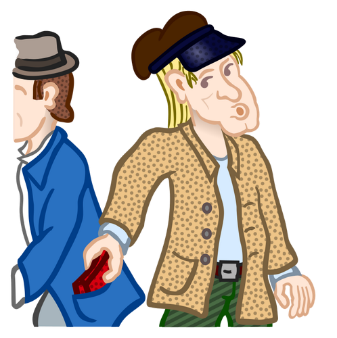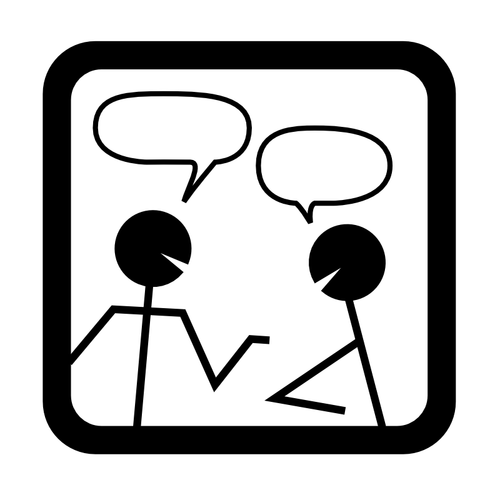6 Kapitel 12.1: Passive
12.1: Passive
What is passive? When writing essays in English, professors often warn against using it. They say that students should write in active voice, not the passive voice.

Wie sieht das Passiv im Englischen aus?
- The book is being read.
- Money was lost.
- People got hurt. People were being hurt.
- My rent is being raised.
→Notice that in English we have a form of is/was + the past participle.
Present Passive:
Wie bildet man das Passiv im Deutschen?
In German, however, we don’t use “is/was”; we use the verb werden + the participle.
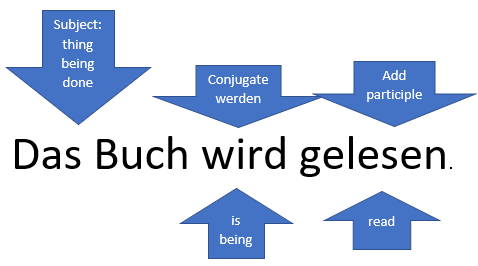
This is the present passive. It is taking place right now at this moment.
If you want to add more info to the sentence, don’t forget to kick the 2nd verb to the end (as German always does.)
- Das Buch wird heute Abend gelesen.
- (The book is being/getting read this evening.)

Aktiv: Das Kind macht das Geschenk auf.
(The child is [actively] opening the present.)
Passiv: Das Geschenk wird aufgemacht.
(The present is being opened.)
Notice that in the passive, we don’t say WHO did the action, only what was done.
Watch Easy German’s video to see another explanation of present passive with lots of real-life examples:
Watch YourGermanTeacher’s video to see a detailed explanation of the difference between active and passive voice:
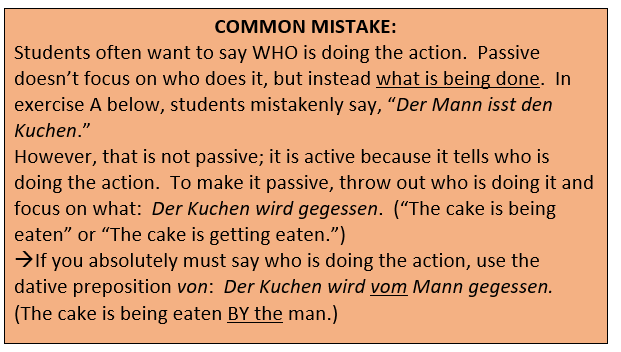
Ex. A: Was wird gemacht? Beschreiben Sie die Bilder im Passiv.
You can also use the passive with “es” as a sort of dummy subject.
- Es wird gearbeitet. (Work is being done.)
- Es wird viel gelacht und getanzt. (There’s a lot of laughing and dancing.)
- Jetzt wird (es) gelernt. (Learning is being done.)
You can even use the passive to say that German is (being) spoken or that something is not allowed.
- Hier wird Deutsch gesprochen. (German is spoken here.)
- Hier wird nicht geraucht. (Smoking is not allowed here.)
Ex. B: Es wird gelacht! Schreiben Sie Sätze im Passiv, die diese Bilder beschreiben.
EXTRA PRACTICE: Present Passive (with and without a subject, aka, “es”)
- https://www.germanzone.org/passive-voice-present-tense-1/
- http://lerngrammatik.de/uebung_verb_passiv_praesens_1.htm
- http://lerngrammatik.de/uebung_verb_passiv_ohne_subjekt_1.htm
Ex. C: Nicos Weg. Episode 56: Theater und Konzerte. Schauen Sie sich die Episode an und machen Sie die Online-übungen.
https://learngerman.dw.com/en/theater-und-konzerte/l-38224911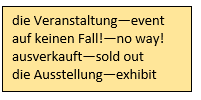
Ex. D: Nicos Weg. Episode 57: Feste und Feiertage. Schauen Sie sich die Episode an und machen Sie die Online-übungen.
https://learngerman.dw.com/en/feste-und-feiertage/l-38263408
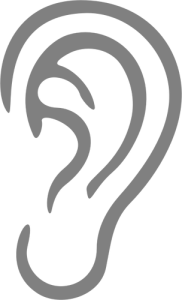
QUICK LISTENING: Listen to Luisa of AudioLingua describe how to sort trash for recycling. Which instance of passive do you hear?
- Was wird jeden Tag recycelt?
- Was wird sonst noch gemacht?
Past Passive:
But what if the thing has already happened? How do we show it in the passive voice?
→Put the helping verb werden into the simple past (das Präteritum)! That’s all!

Active: Martin Luther hat 1521 das Neue Testament übersetzt.
Present Passive: Das Neue Testament wird 1521 von Martin Luther übersetzt.
Past Passive: Das Neue Testament wurde 1521 von Martin Luther übersetzt.
The past passive is often seen in textbooks about things or activities that were completed, as in the example above. You can also use it in everyday life to talk about, say, your car.
- Unser Auto wurde gestern gewaschen. (Our car was washed yesterday)
- Mein Auto wurde letzte Woche repariert. (My car was [being] repaired last week.)

Ex. E: Es wurde… Go back and do exercises A and B in the past passive.
Ex. F: Geschichte. Was wurde von wem entdeckt, erfunden, geschrieben…usw?

Beispiel: Johannes Gutenberg/die Druckerpresse
→Die Druckerpresse wurde von Johannes Gutenberg erfunden.
Johann von Goethe/Die Leiden des jungen Werther
-

Johann von Goethe/Die Leiden des jungen Werther. (“File:Faksimile ‘Die Leiden des jungen Werthers’ von Johann Wolfgang von Goethe, an der Malkastenstraße, April 2018.jpg” by Jula2812 is licensed under CC BY-SA 4.0.) -

Nena/99 Luftballons (“Nena” by paral_lax <°)>< is licensed under CC BY-NC-SA 2.0.) -

Leonardo da Vinci/Mona Lisa (“Mona Lisa, Louvre, Paris” by Songkran is licensed under CC BY-NC-SA 2.0.) -

Frédéric-Auguste Bartholdi/die Freiheitsstatue (“Statue of Liberty” by Charles Sporn is licensed under CC BY-SA 2.0.)
Continue on with Claudia Kost’s and Crystal Sawatzky’s (University of Alberta) extra practice exercises. You will have to determine whether present or past passive is most appropriate.
Ex. G: Was wurde gemacht? Berichten Sie von Ihrem Leben im Passiv.
Beispiel: Meine Hausaufgaben wurden gemacht. Der Hund wurde gefüttert…usw.
EXTRA PRACTICE: Past Passive
- https://www.germanzone.org/passive-voice-simple-past-tense-1/
- http://lerngrammatik.de/uebung_verb_passiv_praeteritum_1.htm
Ex. H: Nicos Weg. Episode 58: Ein Jahr—viele Feste. Gucken Sie das Video und beantworten Sie die Online-Fragen.
https://learngerman.dw.com/en/ein-jahr-viele-feste/l-38240712
Ex. I: Nicos Weg. Episode 59: Was passiert, wenn…? Gucken Sie das Video und machen Sie die Online-übungen. You will review word order with subordinate clauses, which you learned in Chapter 6. You will also review verbs with prepositional complements and da-compounds, which you learned in Chapter 9.![]()
https://learngerman.dw.com/en/was-passiert-wenn/l-38263473
Ex. J: Nicos Weg. Episode 60: So feiern wir! Schauen Sie sich das Video an und machen Sie die Online-übungen. You will review accusative and dative personal pronouns, which you learned in Chapters 2 and 4. You will also review verbs with prepositional complements, which you learned in Chapter 9 and adjective endings, which you learned in Chapter 7.
https://learngerman.dw.com/en/so-feiern-wir/l-38230985

KULTURECKE: Ostern in Deutschland. Hören Sie sich den Bericht über Ostern in Deutschland an. Was wird an diesem Feiertag gemacht? Vergleichen Sie die Traditionen in Deutschland mit denen in Amerika. (Audio used with permission from Germanlistening.com.)
Present Perfect Passive:
The present perfect passive is the conversational past form of passive.
Das verlorene Kind ist gefunden worden.
(The lost child has been found.)

Frage: But why do you have “ist” in that example instead of “hat” like English “has”?
Antwort: You learned earlier in this section that werden is the helping verb that we use for passive. Since this is the conversational past form of passive, it means we’ll have to use sein because that’s werden’s helping verb for conversational past. (Aka. Das Wetter ist kalt geworden.)
Die leckere Pizza ist von meinem Bruder gegessen worden.
(The tasty pizza has been eaten by my brother.)
Frage: But where did the ge– from geworden go? It’s not in either of your examples!
Antwort: In the present perfect passive, we only need one ge-. Basically, you’ll just need to remember that it falls off and fossilizes to worden for these types of sentences.

And don’t forget that, as usual, German kicks the rest of the verbs to the end of the sentence.
Der Mann ist vom Pferd verletzt worden.
(The man has been injured by the horse.)
Frage: But how is this any different from the simple past version of passive. Couldn’t I just say, “Der Mann wurde vom Pferd verletzt“ and have the same meaning?
Antwort: Yes, absolutely! The grammar is different, but the meaning stays the same. Watch YourGermanTeacher’s video to see him giving you more examples of both past passive and present perfect passive while he explains this:
Ex. K: Was ist gemacht worden? Erzählen Sie uns von der letzten Woche. Was ist gemacht worden?
Beispiel: Mein Auto ist gewaschen worden. Der Rasen ist gemäht worden…usw.
The present perfect passive is often heard in the news.

Ex. L: Die Nachrichten. Sie sind Nachrichtensprecher im Fernsehen. Berichten Sie über die folgenden Ereignisse.
-

“broken glass 2” by Nesster is licensed under CC BY 2.0.
-

“Bank Robbery In Progress” by foilman is licensed under CC BY-SA 2.0.
-

“Lieutenant Nick Grimmer of 814 Naval Air Squadron rescue a Kitten” by Royal Navy Media Archive is licensed under CC BY-NC 2.0.
-

“Smell the fresh cut grass” by swisscan is licensed under CC BY-NC-SA 2.0.
-

“A made bed” by shalf is licensed under CC BY-SA 2.0.
-

“Fresh Laundry” by happywanderer1 is licensed under CC BY-NC-SA 2.0.
EXTRA PRACTICE:
http://lerngrammatik.de/uebung_verb_passiv_perfekt_1.htm
https://www.germanzone.org/passive-voice-perfect-tense-1/
Ex. M: Nicos Weg. Episode 61: Herzlichen Glückwunsch! Schauen Sie sich die Episode an und beantworten Sie die Online-Fragen.
https://learngerman.dw.com/en/herzlichen-gl%C3%BCckwunsch/l-38260975
Ex. N: Nicos Weg. Episode 62: Passende Geschenke. Gucken Sie das Video und beantworten Sie die Online-Fragen. Sie wiederholen Pronomen im Akkusativ und im Dativ.
https://learngerman.dw.com/en/passende-geschenke/l-38265710
Past Perfect Passive:
In Section 7-6, you learned the Plusquamperfekt. Go here to review it:
https://una.pressbooks.pub/gr-201/chapter/kapitel-7-6-plusquamperfekt/
As you may be suspecting, yes, there is a passive form for it. The good news is that it’s almost completely identical to the present perfect form. Compare.
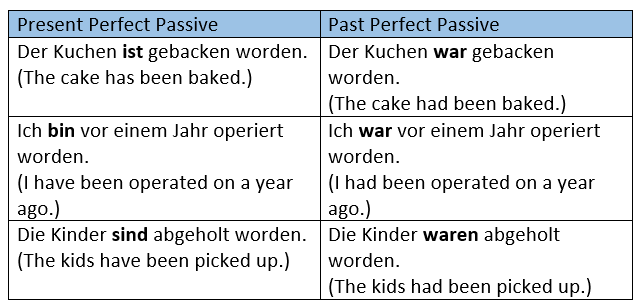
So what’s the difference? Change the verb sein to the past tense. That’s it!
Frage: Yes, but what’s the difference in meaning?
Antwort: Remember how in Section 7-6, we used the Plusquamperfekt to show back story? If we’re telling a story in the past tense and suddenly need to insert something that happened even further back in the past, we use the Plusquamperfekt, aka the past perfect. To make a long story short, it’s further back in the past.
Basically, whenever you say in English “(Something) HAD BEEN (verb-ed),” then you will use the past perfect passive in German.

Notice that the lady is telling about how she couldn’t find her laundry. She then inserts something from further in the past—that the pants had been stolen.
Ex. P: Nicos Weg. Episode 63: Was sollen wir schenken? Schauen Sie sich die Episode an und beantworten Sie die Online-Fragen.
https://learngerman.dw.com/en/was-sollen-wir-schenken/l-38260999
Ex. Q: Nicos Weg. Episode 64: Lieblingsfeste. Gucken Sie die Episode und beantworten Sie die Online-Fragen.
https://learngerman.dw.com/en/lieblingsfeste/l-38262458
Future Passive:
Things can also be done in the future. Therefore, we have the future passive. You did the future tense in Section 2.7. (Go here to review it: https://una.pressbooks.pub/gr101/chapter/section-2-7/.)
We used the helping verb werden to form the future tense.
Die Jugendlichen werden wohl kalte Pizza zum Frühstück essen.
Once again, we will also use werden as our helping verb for the future passive.
- Das Geschirr wird von deinen Großeltern gespült werden.
- o The dishes will be washed by your grandparents.
- Der Tisch wird schnell abgeräumt werden.
- o The table will be cleared.
- Unsere Klamotten werden einmal die Woche gebügelt werden.
- o Our clothes will be ironed once a week.
- Wir werden von unseren Mitarbeitern ausgelacht werden.
- We will be laughed at by our coworkers.
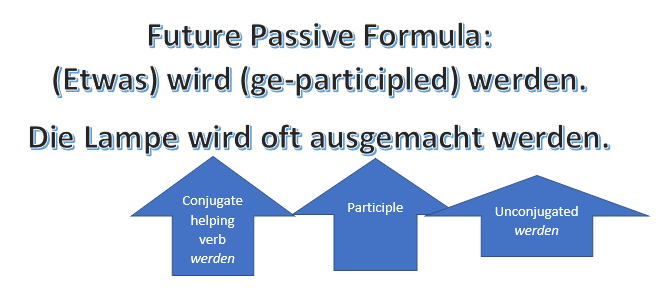
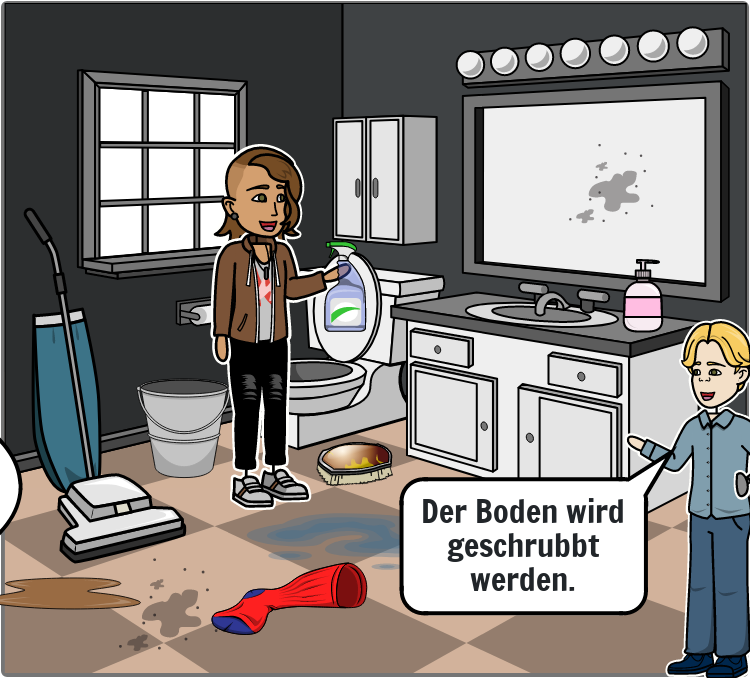
The floor will be scrubbed.
Ex. R: Was wird gemacht werden? Schauen Sie sich das Bild an. Was wird vor dem Ende des Tages gemacht werden? Seien Sie kreativ!
Ex. S: Was wird heute gemacht werden? Diskutieren Sie Ihren Tag! Was wird gemacht werden? Was nicht?
Beispiel: Das Essen wird nicht gekocht werden. Ich habe einfach keine Zeit…usw.
EXTRA PRACTICE: All passive forms (mixed practice)
Ex. T: Nicos Weg. Episode 65: Ein Praktikum beim Film. Schauen Sie sich die Episode an und machen Sie die Online-übungen. You will review relative clauses in the dative case, which you learned in Chapter 10.
https://learngerman.dw.com/en/ein-praktikum-beim-film/l-38241054
Ex. U: Nicos Weg. Episode 66: Der Film war toll! Gucken Sie die Episode und machen Sie die Online-übungen. Sie wiederholten den Genitiv (Kapitel 6).
https://learngerman.dw.com/en/der-film-war-toll/l-38263639
Passive with Modal Verbs:
Finally, we can also have passive with modal verbs.

- Die Küche muss heute aufgeräumt werden.
- The kitchen must be cleaned up today.
- Der Vogel soll morgens und abends gefüttert werden.
- o The bird should be fed mornings and evenings.
- Der Täter kann leider nicht gefunden werden.
- o The culprit cannot be found, unfortunately.
- Der Patient will informiert werden.
- o The patient wants to be informed.


- Die Küche musste gestern aufgeräumt werden.
- o The kitchen had to be cleaned up yesterday.
- Der Vogel sollte morgens und abends gefüttert werden.
- The bird was supposed to be fed mornings and evenings.
- Der Täter konnte leider nicht gefunden werden.
- o The culprit could unfortunately not be found.
- Der Patient wollte informiert werden.
- o The patient wanted to be informed.
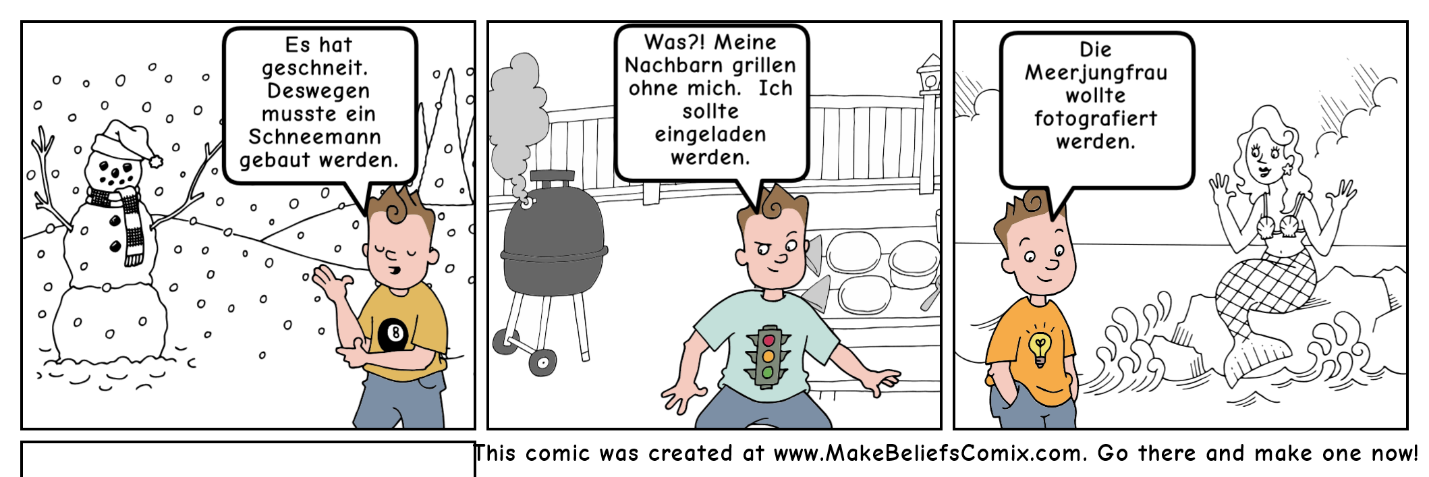
Ex. V: Was muss oder soll gemacht werden? Diskutieren Sie die heutige Gesellschaft. Was für Probleme gibt es? Was muss gemacht werden, um diese Probleme zu beseitigen? Seien Sie kreativ!
Beispiel: Es gibt nicht genug Parkplätze an der Uni. Ein neuer Parkplatz soll gebaut werden…usw.
Ex. W: Nicos Weg. Episode 67: Im Filmstudio. Schauen Sie sich die Episode an und machen Sie die Online-übungen. Sie wiederholen Wechselpräpositionen (GR 102).
https://learngerman.dw.com/en/im-filmstudio/l-38270486
Ex. X: Nicos Weg. Episode 68: Ich bin Schauspieler. Gucken Sie das Video und beantworten Sie die Online-Fragen. Sie wiederholen Wechselpräpositionen.
https://learngerman.dw.com/en/ich-bin-schauspieler/l-38263738








